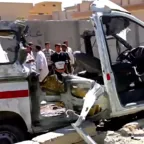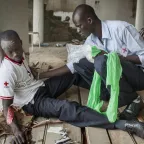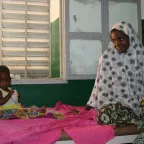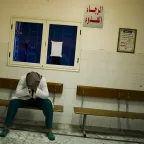Study on the Management and Operationalization of Health Care in Danger as a cross-cutting Initiative
… commissioned an external evaluation of the Health Care in Danger (HCiD) initiative. This evaluation took …
… commissioned an external evaluation of the Health Care in Danger (HCiD) initiative. This evaluation took …
… The Health Care in Danger community is a unique force of change. … practice measures to protect patients and health care workers from violence. This …
… Health Care in Danger, an ambitious project of the Red Cross … how they can help improve safe access to health care. …

… Organized jointly by the Iraqi Ministry of Health and Environment and the International … public awareness campaign entitled Health Care in Danger has been launched on 12 November during …
… of Operations and the heads of four major health care organizations. Babak Ali Naraghi, Head of the Health Care in Danger project, explaining how the ICRC engages …
… of cholera. We asked Veronica Kenyi, SSRC health manager, to tell us how her National … in South Sudan affecting the delivery of health care? Health facilities are being looted and …

… What were the main challenges to providing health care in Mali? The first challenge was obviously … to protect our hospitals and staff from danger. Next, I went to speak with the various …

… mental, is also essential to ensuring that health facilities function. This was the clear … of Health Facilities" as part of the Health Care in Danger project. The workshops generated a …

… mark the launch of The Ethical principles of health care in times of armed conflict and other … code of ethics, already signed by five major health care organizations representing 30 …
… Papua New Guinea The wrecked rooms of a health-care clinic, destroyed in the midst of a tribal … stood abandoned for more than a year, with health-care workers too scared to stay in the …

Try one of the following resources:
Created in 1863, the ICRC library, alongside the ICRC archives, provides an indispensable documentary reference on the organization itself and international humanitarian law.
International humanitarian law is based on a number of treaties, in particular the Geneva Conventions of 1949 and their Additional Protocols, and a series of other instruments.
Customary international humanitarian law consists of rules that come from "a general practice accepted as law" and that exist independent of treaty law.